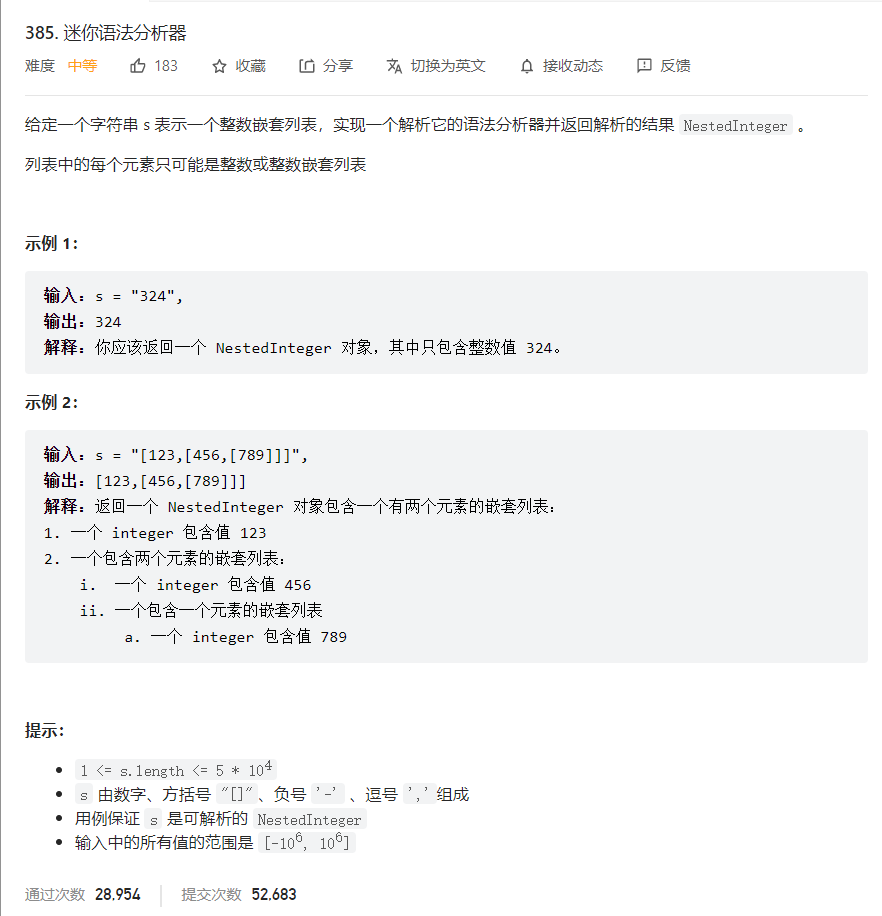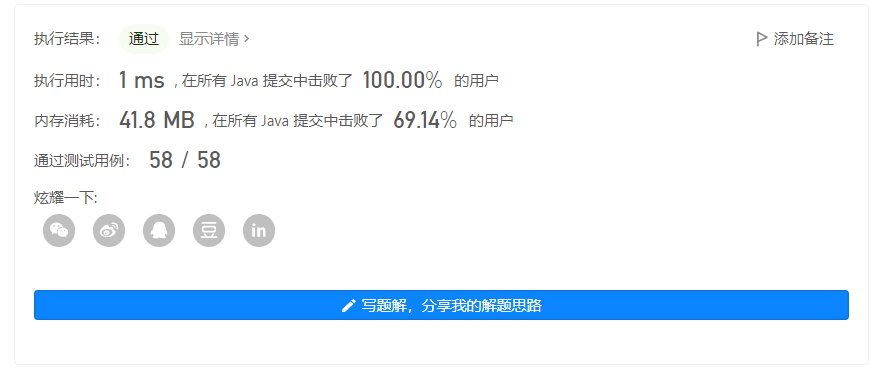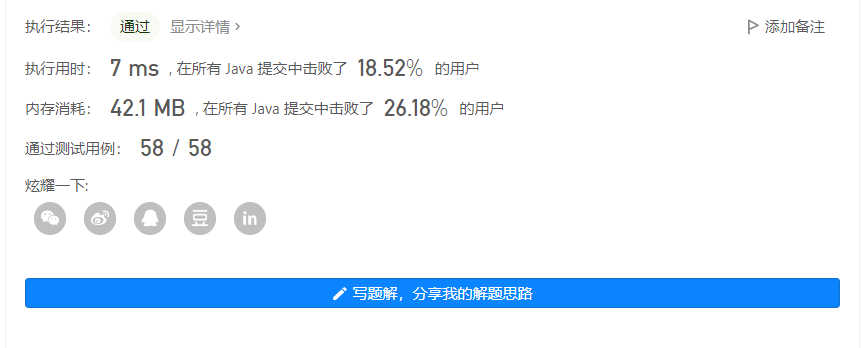🌕🌕 385. 迷你语法分析器
2022年10月10日
- algorithm
🌕🌕 385. 迷你语法分析器
难度: 🌕🌕
问题描述

解法 1 - 递归
/**
* // This is the interface that allows for creating nested lists.
* // You should not implement it, or speculate about its implementation
* public interface NestedInteger {
* // Constructor initializes an empty nested list.
* public NestedInteger();
*
* // Constructor initializes a single integer.
* public NestedInteger(int value);
*
* // @return true if this NestedInteger holds a single integer, rather than a nested list.
* public boolean isInteger();
*
* // @return the single integer that this NestedInteger holds, if it holds a single integer
* // Return null if this NestedInteger holds a nested list
* public Integer getInteger();
*
* // Set this NestedInteger to hold a single integer.
* public void setInteger(int value);
*
* // Set this NestedInteger to hold a nested list and adds a nested integer to it.
* public void add(NestedInteger ni);
*
* // @return the nested list that this NestedInteger holds, if it holds a nested list
* // Return empty list if this NestedInteger holds a single integer
* public List<NestedInteger> getList();
* }
*/
class Solution {
public NestedInteger deserialize(String s) {
// 思路:
// 多位数字的解析 + 递归
int len = s.length();
return mySol(s, 0, len - 1);
}
private NestedInteger mySol(String s, int left, int right) {
NestedInteger res = new NestedInteger();
char c = s.charAt(left);
if(c != '[') {
// 123,456,[788,799,833],[[]],10,[] 不满足要求,说明如果初始不是左中括号的话,后面只能跟一个整数
int num = getNumber(s, left, right);
res.setInteger(num);
// System.out.println(s.charAt(left) + " " + num);
return res;
}
// c == '['
// 说明是个嵌套对象
// 遍历,进行拆分,是整数就添加整数,遇到嵌套递归
left ++;
right --; // 去掉最外层中括号
int i = left;
int j = left;
while(i <= right) {
// 如果左边界为左括号,只有 左括号与右括号正好抵消时递归
// 如果左边界不为左括号,说明是数字,遇到 逗号递归
if(s.charAt(i) == '[') {
int count = 1; // 从 i 开始往右找左括号的数量
j = i + 1;
while(j <= right && count != 0) {
if(s.charAt(j) == '[') {
count ++;
}
if(s.charAt(j) == ']') {
count --;
}
j ++;
}
res.add(mySol(s, i, j - 1));
} else {
j = i;
while(j <= right && s.charAt(j) != ',') {
j ++;
}
res.add(mySol(s, i, j - 1));
}
i = j + 1;
}
return res;
}
private int getNumber(String s, int left, int right) {
int res = 0;
boolean flag = true;
for(int i = left; i <= right; i ++) {
char c = s.charAt(i);
if(c == '-') {
flag = false;
} else {
int cur = c - '0';
res = res * 10 + cur;
}
}
return flag ? res : -res;
}
}
输出 1

解法 2 - 栈
/**
* // This is the interface that allows for creating nested lists.
* // You should not implement it, or speculate about its implementation
* public interface NestedInteger {
* // Constructor initializes an empty nested list.
* public NestedInteger();
*
* // Constructor initializes a single integer.
* public NestedInteger(int value);
*
* // @return true if this NestedInteger holds a single integer, rather than a nested list.
* public boolean isInteger();
*
* // @return the single integer that this NestedInteger holds, if it holds a single integer
* // Return null if this NestedInteger holds a nested list
* public Integer getInteger();
*
* // Set this NestedInteger to hold a single integer.
* public void setInteger(int value);
*
* // Set this NestedInteger to hold a nested list and adds a nested integer to it.
* public void add(NestedInteger ni);
*
* // @return the nested list that this NestedInteger holds, if it holds a nested list
* // Return empty list if this NestedInteger holds a single integer
* public List<NestedInteger> getList();
* }
*/
class Solution {
NestedInteger monitor = new NestedInteger(-1); // 标志元素,表示左括号压入的元素,当遇到右括号时遇到它终止
public NestedInteger deserialize(String s) {
// 思路:
// 栈
// 遍历字符串
// 遇到 '[' 压入一个新的 NestedInteger()
// 遇到 ']' 依次取出栈中元素,直到遇到一个 NestedInteger() 而非 NestedInteger(int value)
// 遇到 ',' 跳过
// 遇到 数字,找到数字边界,压入 NestedInteger(int value)
int len = s.length();
LinkedList<NestedInteger> stack = new LinkedList<>();
int index = 0;
while(index < len) {
char c = s.charAt(index);
if(c == ',') {
index ++;
continue;
} else if(c == '-' || (c >= '0' && c <= '9')) {
// 数字
int j = index;
while(j < len && (s.charAt(j) == '-' || (s.charAt(j) >= '0' && s.charAt(j) <= '9'))) {
j ++;
}
int num = getNumber(s, index, j - 1);
stack.push(new NestedInteger(num));
index = j;
} else if(c == '[') {
// 左中括号
stack.push(new NestedInteger());
stack.push(monitor);
index ++;
} else if(c == ']') {
// 右中括号
// 依次弹栈,直到遇到第一个与之匹配的左括号,弹出的元素也需要保存,这些元素是单整数
ArrayList<NestedInteger> list = new ArrayList<>();
while(!stack.isEmpty() && stack.peek() != monitor) {
list.add(stack.pop());
}
if(!stack.isEmpty()) {
stack.pop(); // 弹出标志元素
NestedInteger cur = stack.pop(); // 压入的空元素
// 将 list 的元素逆序压入 cur
int size = list.size();
for(int k = size - 1; k >= 0; k --) {
cur.add(list.get(k));
}
// 将 cur 重新压入栈中
stack.push(cur);
}
index ++;
}
// System.out.println(s.charAt(index));
}
return stack.peek();
}
private int getNumber(String s, int left, int right) {
int res = 0;
boolean flag = true;
for(int i = left; i <= right; i ++) {
char c = s.charAt(i);
if(c == '-') {
flag = false;
} else {
int cur = c - '0';
res = res * 10 + cur;
}
}
return flag ? res : -res;
}
}
输出 2
